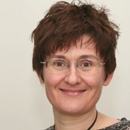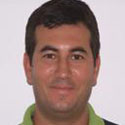Academic Editors
The following people constitute the Editorial Board of Academic Editors for PeerJ. These active academics are the Editors who seek peer reviewers, evaluate their responses, and make editorial decisions on each submission to the journal. Learn more about becoming an Editor.

Maria A. Deli
Scientific advisor at the Institute of Biophysics, Biological Research Centre of the Hungarian Academy of Sciences in Szeged, Hungary. Head of the Biological Barriers Research Group. Honorary professor at the University of Szeged.

Donovan H Parks
Donovan Parks holds a PhD in computer science and has developed a number of bioinformatic programs used by the research community including CheckM, STAMP, and GenGIS. He has expertise in bioinformatics relating to microbial ecology, phylogenetics, and metagenome-assembled genomes. He is currently working as a bioinformatic consultant with the Australian Centre for Ecogenomics where he is working on an initiative to resolve long-standing issues within bacterial and archaeal nomenclature and developing new tools for reconstructing and validating genomes obtained directly from environmental samples.

Timothy Omara
Timothy Omara is an Assistant Lecturer of Chemistry at the Department of Chemistry, College of Natural Sciences, Makerere University, Uganda.
Research interests are at the interface of food science and toxicology, analytical and environmental chemistry employing advanced analytical techniques. Current focus is on [micro/nano]plastics analysis using µ-FTIR and Pyrolysis GC-MS. Academic Editor in PeerJ, PLoS ONE and Journal of Food Quality [Wiley]

Kyoshiro Sasaki
Dr. Kyoshiro Sasaki is an experimental psychologist and an Associate Professor within the Faculty of Informatics at Kansai University. He obtained his PhD in 2016 where he engaged in research on embodied emotion. He has a wide range of research interests; emotion, embodied cognition, object recognition, spatial and temporal cognition, psychological ownership, and metascience.
Dr. Sasaki is an editorial board member of Humanities and Social Sciences Communications, PLOS ONE, the Japanese Journal of Psychonomic Science, and the Japanese Journal of Research on Emotions. He is also a Recommender of Peer Community In Registered Reports.

Erik R Seiffert
Erik Seiffert's research is focused on the phylogenetic relationships, adaptations, and historical biogeography of mammals, with an emphasis on the endemic placental mammals of Africa and Arabia. He has a B.A. from the University of California at Berkeley (1995), an M.A. from the University of Texas at Austin (1998), and a Ph.D. from Duke University (2003). He was previously Lecturer in Palaeobiology and Palaeoenvironments at University of Oxford and Curator of Geological Collections at the Oxford University Museum of Natural History (2004-2007), Assistant and Associate Professor of Anatomical Sciences at Stony Brook University (2007-2016), and is now a Professor of Integrative Anatomical Sciences at the Keck School of Medicine of the University of Southern California (2016-Present). He is also a Research Associate at the Duke Lemur Center's Division of Fossil Primates and in the Department of Mammalogy, Natural History Museum of Los Angeles County.

Michael S Rappé
Mike is a tenured Research Professor at the Hawaii Institute of Marine Biology, and is a member of the graduate faculty with the Departments of Oceanography, Microbiology, and the interdisciplinary Marine Biology Graduate Program at the University of Hawaii at Manoa. The overarching theme of his research is to understand the impact of microbial genetic diversity on ocean ecology, and interpret this diversity through the lens of bacterial taxonomy and evolution. He investigates the ecology and evolution of marine microorganisms by combining surveys of natural microbial communities, nucleic acid sequence data, and studies with model systems in controlled laboratory settings.

Jian Zhang
Dr. Jian Zhang currently works at the Division of Gastrointestinal Surgery & Gastric Cancer Center, The First Affiliated Hospital of Sun Yat-sen University. Jian does research in Genetics/Epigenetics and Cancer Research. He is also the editorial board member of Frontiers in Oncology and Frontiers in Bioinformatics.

Jayakumar Saikarthik
Dr Saikarthik has an undergraduate degree in Radiology and Imaging Sciences Technology from Sri Ramachandra Medical College and Research Institute, India. He obtained his MSc in Medicine and Anatomy, followed by a PhD in the same specialty from the prestigious Saveetha University, India.
Dr Saikarthik's research interests include, Gross and Radiological Anatomy, Neurogenesis and Neurohistology, Psychiatric Epidemiology, Medical Education and Qualitative Research Methods. He has authored many scientific articles which have been published in ranked journals. Recently he has also published a book chapter on the association of COVID-19 with neurogenesis.
Dr Saikarthik is a fellow from the Institute of Biomedical Sciences, UK; Member of the British Association of Clinical Anatomy; Member of the Saudi Society of Medical Education and Member of the Royal Society of Biology UK. He is also a member and certificate holder of Essential Skills in Medical Education from Association of Medical Education from Europe.
Some of his awards include: Best oral presentation award from Association of Anatomist of Tamilnadu, Young researcher in Anatomy and Mental health (2021) and Global Faculty Award (2020). He is also currently an Associate Editor at Majmaah Journal of Health Sciences.

Nicola Decaro
Professor of Infectious Diseases of Animals and Director of the Post-graduate School of Infectious Diseases at the Department of Veterinary Medicine, University of Bari, Italy.

Himanshu Singh
Presently, I am working as a Senior Research Scientist at Memorial Sloan Kettering Cancer Center, New York, USA. My research interest includes “epigenetics and transcriptional regulation”. My research work is focused on exploring microenvironment of high-grade tumors arise in the overall course of the disease and in relation to treatment.
During 2021-22, I worked as Postdoctoral Research Scientist at Columbia University, New York, US. My work was to explore differences between regulatory networks involved in cancer and normal tissues using bioinformatics and computational biology. Earlier, I was working as Post-Doc at TAGC, INSERM, Aix Marseille University, Marseille, France during 2018-21. My research work was focused on the Identification of Epromoters, promoters showing enhancer activity, like clusters in various stress conditions. We have developed a pipeline to identify Epromoter like clusters. During 2016-18, I worked as Research Associate at CSIR-Institute of Genomics & Integrative Biology, New Delhi, India. My work was focused on the identification and validation of genetic and epigenetic biomarkers for high altitude phenotypes using bioinformatics approaches. I pursued my Ph.D. work at the Department of Biochemistry, All India Institute of Medical Sciences (AIIMS), New Delhi, India, and earned my Ph.D. degree from NIU, India in 2016.
In my tenure, I have published around FIFTY Articles. In addition to this, I was awarded an Independent Research Project from the Indian Council of Medical Research, India. I was also an Invited Researcher (two times) at the Department of Medical Chemistry, Medical University of Vienna, Vienna, Austria. I was also awarded various travel grants from Indian and overseas funding agencies to present my research work.

Rajesh Kumar Singh
Dr. Rajesh Kumar Singh received his BPharm (2003) and MPharm (2005) from UIPS, Panjab University, Chandigarh. He started to teach pharmaceutical chemistry at the Shivalik College of Pharmacy, Nangal, in 2006, where he completed his PhD in 2013 from IKG Punjab Technical University (IKGPTU), Jalandhar. His major areas of research interest are computer-aided drug-design, polymer-drug conjugates for targeted delivery to CNS and cancerous cells, antimalarial therapeutic agents, and green chemistry approaches for chemical synthesis. Dr. Singh has over 15 years of teaching experience and has guided one 03 Ph.D. and 20 PG students. He is currently guiding 02 PhDs and 02 MPharm students. He has published more than 70 peer-reviewed SCI/SCOPUS-indexed scientific papers with a total JCR Impact Factor of more than 200 in various chemistry and pharmacy journals such as European Journal of Medicinal Chemistry, Acta Pharmaceutica Sinica-B, Bioorganic Chemistry, Biomedicine and Pharmacotherapy, Pharmaceutical Research, European Journal of Pharmaceutical Sciences, Mini-Reviews in Medicinal Chemistry, Pharmaceutical Research, Med. Chem. Res., J. Enzyme Inhi. Med Chem., Res. Chem. Intermediate etc as main or corresponding author. He currently serves as an Editorial Advisory Board Member of 10 international journals, including the SCI-indexed MRMC (Bentham) and PeerJ. He has received the Publon Award 2016, 2017 and the Publon "Excellent Peer Reviewer Award" for outstanding reviewing of more than 290 research papers in different international journals of ACS, RSC, Springer, Elsevier, Dove, Informa, and Bentham whose Impact Factor varies from 1.0 to 12.5. He also has over 60 National and International Conference Abstracts, 5 Books, 5 Best Paper Presentation Awards, 1 Travel Grant to attend International Conferences, and 5 Research Projects funded by Indian Government Agencies. He is also on the panel of international reviewers for research proposals for Royal Society Grants. He is also serving as a PUBLON ACADEMY MENTOR and a BENTHAM BRAND AMBASSADOR. He has been recognized by the Editors as an OUTSTANDING REVIEWER for RSC Medicinal Chemistry journal (IF 4.1, Q1) and also for BENTHAM PUBLISHER in 2023. His name is recently featured in the list of top 2% scientists (2023) ranked by team of Stanford University, USA and Elsevier.

Humaira Yasmin
Dr Humaira Yasmin is tenured Associate professor (TTS) within the Department of Biosciences, COMSATS University, Islamabad, Pakistan. Her research interests include plant-microbe interactions, plant stress physiology, biofertilizers technology, soil microbiology, crop pathology, plant protection, plant biochemistry and molecular biology, medicinal plants, environmental microbiology, and agricultural nanotechnology. Dr Yasmin's research focuses on understanding the detailed biochemical mechanisms adapted by crops when exposed to biotic (fungal/ bacterial) pathogens, abiotic stresses (drought, salinity, heavy metals and heat). She is also investigating various eco-friendly and economic solutions to reduce the adverse impacts of environmental stresses on economically important crops. The techniques studied include isolation, characterization and mode of action of plant growth-promoting rhizobacteria (PGPR). Green synthesis and characterization of nanoparticles from medicinal plants and their application in agriculture to alleviate different stresses. Application of growth regulators (hormones (GA, ABA, SA, BS etc.), chelators (Oxalic acid, mellic acid etc.) and other chemical compounds to increase plant protection. Moreover, synergistic effects of the above mentioned solutions are also under consideration.

